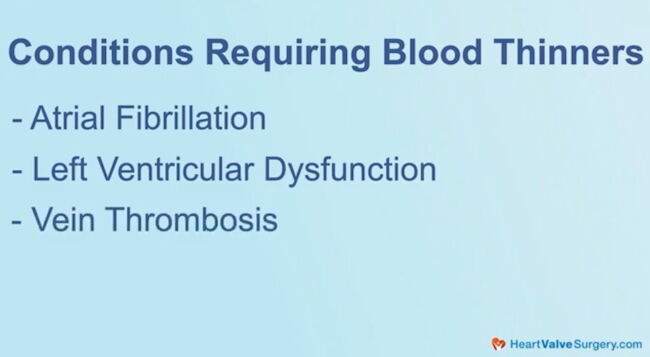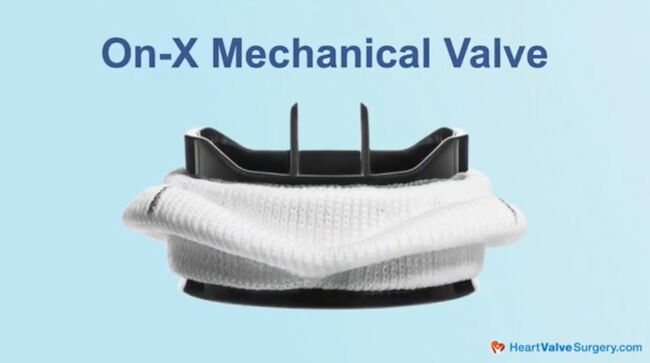Blood Thinners & Tissue Heart Valves: What Should Patients Know?
Written By: Allison DeMajistre, BSN, RN, CCRN
Medical Expert: Marc Gerdisch, MD, Chief of Cardiac Surgery, Franciscan Health, Indianapolis, Indiana
Reviewed By: Adam Pick, Patient Advocate, Author & Website Founder
Published: August 14, 2025
Perhaps one of the most significant concerns and considerations for patients anticipating heart valve replacement surgery is whether they will need to take blood thinning medications for the rest of their lives.
For many patients, it can be the deciding factor in which valve to choose – a mechanical valve or tissue valve – as blood thinners come with various risks and side effects that patients must manage throughout their lifetime. Mechanical valves require blood thinners to prevent blood clots from forming. Tissue valves don’t necessarily require anticoagulation, but certain conditions associated with heart valve disease or other health problems may still necessitate the use of blood-thinning medication for patients.
We receive many patient questions about heart valve surgery and blood thinners. For example, Shirley just asked us, “I’ve read that patients who get tissue valves may go on blood thinners after heart surgery. Is that true? I thought that blood thinners were only for mechanical valve replacement patients.” To answer Shirley’s question, we met with Dr. Marc Gerdisch, the Chief of Cardiac Surgery at Franciscan Health in Indianapolis, Indiana. Dr. Gerdisch has become one of the most beloved surgeons in our community, having successfully treated more than 100 patients at HeartValveSurgery.com.
Blood Thinners After Tissue Valve Replacement Surgery
Here are the key insights shared by Dr. Gerdisch:
- Data shows that patients with tissue valves often need anticoagulation. “It’s a very insightful question and a very important one,” said Dr. Gerdisch. “If we look at the larger data for transcatheter valves and tissue valves, approximately 30 percent of patients with tissue valves, of either type, are anticoagulated. So, that’s not just anti-platelet agents like aspirin or Plavix, but patients are taking either Warfarin or a Direct-Acting Oral Anticoagulant (DOAC), such as Eliquis, which actively thins your blood. The reason for this is that they have other conditions that require it. So, they might develop atrial fibrillation or have underlying left ventricular dysfunction.” Other events that may require anticoagulation include pulmonary embolism, a blood clot in the lungs, and deep vein thrombosis (DVT), a clot in the legs. Dr. Gerdisch said anticoagulation is also required as tissue valves begin to thicken and move closer to failure.

- It’s essential for patients to consider the medical research. “There is a great paper from several years ago that shows a diagram that fundamentally tells us that we’re probably not anti-coagulating as many people as we’re supposed to,” said Dr. Gerdisch. “People with tissue valves who have other conditions require it. For mechanical valves, you must be on the blood thinner Coumadin. It is the only drug we can use for mechanical valves. We just published our five-year data showing that we can reduce the dose dramatically, where patients can have an INR of 1.5 to 2.0 with the On-X mechanical valve specifically, but they must be anti-coagulated, and that needs to be followed.”
Thanks Dr. Gerdisch and Franciscan Health!
On behalf of all the patients in our community, thanks to Dr. Marc Gerdisch, for everything you and your team are doing at Franciscan Health in Indianapolis, Indiana!
Related Links:
- Research Alert: New 5-Year Safety Data on On-X Mechanical Aortic Valve at Low INR
- Surgeon Q&A: Rapid Recovery Protocol 2.0
- Free Heart Valve eBook: Ask Dr. Gerdisch Anything
Keep on tickin,
Adam
P.S. For the deaf and hard-of-hearing members of our patient community, we have provided a written transcript of our interview with Dr. Gerdisch below.
Video Transcript:
Adam Pick: Hi everybody, it’s Adam with HeartValveSurgery.com and we’re in Los Angeles, California at the Society of Thoracic Surgeons Conference. I am thrilled to be joined by Dr. Mark Gerdisch who’s the Chief of Cardiac Surgery at Franciscan Health in Indianapolis, Indiana.
Dr. Gerdisch, you and I have now known each other for over 10 years. You’re beloved by our community. You’ve successfully treated more than a hundred heart valve patients at HeartValveSurgery.com. It is great to see you again at STS. Thanks for being with me.
Dr. Marc Gerdisch: Thanks. Always a pleasure.
Adam Pick: Dr. Gerdisch, you’re giving talks here. We’re seeing a lot of great presentations. about new data and research about valve therapy. We’re also getting questions from patients coming in from all over the world. This one comes in from Shirley, and she asks, “I’ve read that patients who get tissue valves may go on blood thinners after heart surgery. Is that true? I thought that blood thinners were only for mechanical valve replacement patients.”
Dr. Marc Gerdisch: It’s a very insightful question. And a very important one too. If we look at the data, the larger data, for transcatheter valves and tissue valves, approximately 30 percent of patients who have tissue valves, of either type, are anticoagulated.
So, meaning that not just antiplatelet agents, not just aspirin or Plavix, but are taking either Warfarin or a Doac, Noac, these are the drugs like Eliquis, that thin your blood actively. And the reason for it is that they have other conditions that demand it. So they might develop atrial fibrillation. They might have underlying left ventricular dysfunction.
They might have had a thromboembolic event that requires them to be anticoagulated or a thrombosis in a vein that requires them to be anticoagulated. The other thing is, as the tissue valve fails, as the gradient goes up and a tissue valve fails, as it thickens, In theory, we’re supposed to anti-coagulate those people.
So, there’s a great paper from several years ago that shows this diagram that fundamentally tells us that we’re probably not even anticoagulating as many people as we’re supposed to. People with tissue valves, people who’ve had other conditions that require it. Uh, it is true that for mechanical valves, you have to be on blood thinner, right?
You have to be on Coumadin, and that’s the only drug that we can use for that. We just published our five-year data showing that we can reduce the dose dramatically with the On-X mechanical valve specifically. But they do have to be anticoagulated and that needs to be followed.
Adam Pick: Shirley, I hope that helped you learn a whole lot about blunt thinners for both tissue and mechanical valves. And Dr. Gerdisch, thanks so much for everything you and your team are doing at Franciscan Health in Indianapolis, India. And thanks for being with me today.
Dr. Marc Gerdisch: Thank you, Adam.





